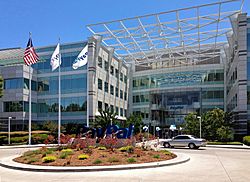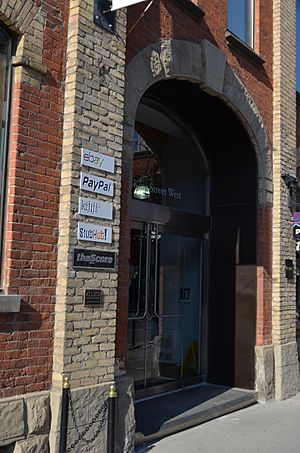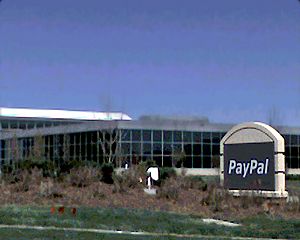PayPal facts for kids
 |
|

Headquarters in San Jose, California
|
|
| Public | |
| Traded as | |
| Industry | Financial technology |
| Predecessors |
|
| Founded |
|
| Founders |
|
| Headquarters | San Jose, California, U.S. |
|
Area served
|
Almost worldwide |
|
Key people
|
|
| Products | Credit cards, payment systems |
| Revenue | |
|
Operating income
|
|
| Total assets | |
| Total equity | |
|
Number of employees
|
24,400 (2024) |
| Divisions |
|
| Subsidiaries |
|

PayPal Holdings, Inc. is an American company that helps people send and receive money online. It's like an electronic way to pay for things, instead of using paper checks or money orders. PayPal works for online stores, auction sites, and many other businesses. They charge a small fee for their services.
PayPal started in 1998 as a company called Confinity. It became a public company in 2002, meaning its shares could be bought and sold by anyone. Later that year, eBay bought PayPal for $1.5 billion. In 2015, eBay decided to let PayPal become its own independent company again. PayPal is a very large company, ranked among the biggest in the United States by how much money it makes.
Contents
How PayPal Started
PayPal began in December 1998. It was first called Fieldlink, then Confinity. The founders were Max Levchin, Peter Thiel, and Luke Nosek. They first tried to make security software for hand-held devices. When that didn't work out, they changed their focus to a "digital wallet" for online payments. The first version of PayPal's payment system came out in 1999.
In March 2000, Confinity joined with X.com. This was another online financial company started by Elon Musk and others. Elon Musk believed strongly in the money transfer idea that Confinity was working on. After some changes, X.com was renamed PayPal in June 2001. It became a public company in 2002, with its shares listed on the NASDAQ stock market.
PayPal and eBay
Soon after PayPal became a public company, eBay bought it on October 3, 2002. eBay paid $1.5 billion for PayPal. At that time, most eBay auctions accepted PayPal payments. About one out of every four items sold on eBay used PayPal. This made PayPal the main way people paid on eBay.
In 2005, PayPal bought a company called VeriSign to make its payments even more secure. In 2007, PayPal worked with MasterCard to create the PayPal Secure Card service. This allowed customers to use PayPal on websites that didn't directly accept it. By the end of 2007, PayPal was making $1.8 billion in revenue.
By 2010, PayPal had over 100 million active users in 190 different markets. They could use PayPal in 25 different currencies. PayPal also started to let people use its service to pay in physical stores, not just online. In 2012, PayPal partnered with Discover Card. This allowed PayPal payments to be made at millions of stores that accepted Discover cards. By the end of 2012, PayPal processed $145 billion in payments.
Becoming Independent Again
On September 30, 2014, eBay announced that PayPal would become a separate company again. This was something that a large investor, Carl Icahn, had asked for. The split happened on July 18, 2015. PayPal's shares were then listed on Nasdaq again under the same symbol, PYPL.
In 2015, PayPal bought a company called Xoom Corporation. Xoom helps people send money digitally to other countries. This deal helped PayPal grow its international business. It gave PayPal access to Xoom's many customers who sent money to people in 37 countries.
On September 1, 2015, PayPal launched "PayPal.Me." This service lets users create a special link to ask for money from friends or family. You can send this link through text, email, or other messages. For example, it could be PayPal.me/yourusername/amount. This made it easier and faster to share payments, especially on mobile phones.
In May 2018, PayPal bought a Swedish payment company called iZettle for $2.2 billion. This was PayPal's biggest purchase at the time. iZettle helped PayPal offer more ways for businesses to accept payments in stores. In 2019, PayPal partnered with Instagram for its new "Checkout on Instagram" feature.
In January 2020, PayPal bought Honey for over $4 billion. This was PayPal's largest purchase ever. Honey is a web browser extension that helps users find coupons and deals when shopping online.
In January 2021, PayPal became the first foreign company to have full control of a payment platform in China. This gave them a strong position in the Chinese online payment market. In February 2023, PayPal announced it would reduce its workforce by about 2,000 employees. In August 2023, Alex Chriss became the new CEO of PayPal.
In August 2023, PayPal launched a new digital currency called PayPal USD (PYUSD). This is a "stablecoin," which means its value is designed to stay the same as the U.S. dollar. It can be used for payments and transfers.
How PayPal Works
PayPal allows people to make financial transactions online. It lets you send or receive money electronically between individuals and businesses. You can use PayPal to pay for things on websites like eBay, buy or sell goods, or even donate money. You don't always need a PayPal account to use some of its services.
In 2007, PayPal bought a company called Bill Me Later, which was later renamed PayPal Credit. This service lets shoppers get an instant line of credit to use at thousands of stores that accept PayPal. It works much like a traditional credit card.
From 2009 to 2016, PayPal had "Student Accounts." Parents could set up an account for their children, put money into it, and get a debit card for them to use. This helped teach kids how to manage money. PayPal stopped offering Student Accounts in August 2016.
In 2012, PayPal launched "PayPal Here." This was a mobile payment system for small businesses. It included a free mobile app and a small card-reader that plugged into a smartphone. This allowed businesses to accept card payments on the go.
In October 2020, PayPal announced a new service. It allowed customers to use cryptocurrencies like bitcoin to shop at millions of merchants starting in 2021. PayPal worked with Paxos Trust to make sure this was done safely and followed financial rules.
As of 2022, PayPal operates in 202 markets around the world. It has 426 million active accounts. PayPal lets customers send, receive, and hold money in 25 different currencies.
Business Growth
PayPal's growth happened in three main steps. First, they focused on getting more eBay users in the U.S. to use their service. Second, they expanded PayPal to eBay's international websites. Third, they started to grow PayPal's business outside of eBay.
In the beginning, most payments came from eBay auctions. PayPal was great for sellers, especially small businesses, who couldn't easily accept credit cards. It was also good for buyers because they could pay with credit cards or bank accounts without sharing their card numbers with unknown sellers. PayPal even offered $10 to new users to encourage them to join!
Later, PayPal changed its focus to business accounts. Instead of just earning interest on money held in accounts, they started earning money from service fees. They offered protection for sellers, as long as they followed certain rules, like proving that items were shipped.
After becoming very popular on eBay, PayPal started to focus on businesses outside of eBay. They created a special team called "Merchant Services." This team helped online stores that weren't on eBay use PayPal for payments. They lowered fees for large businesses and encouraged users to tell other businesses about PayPal. They also worked with other payment companies to include PayPal as an option.
Where PayPal is Located

PayPal's main headquarters are in San Jose, California. They also have a big operations center in La Vista, Nebraska, which opened in 1999. Since 2007, PayPal has operated across the European Union as a bank based in Luxembourg. Their international headquarters are in Singapore. PayPal also has technology and software development centers in places like Scottsdale, Arizona, Chennai, India, and Kuala Lumpur, Malaysia.
Global Presence
PayPal can be used in over 200 countries and regions. Different countries have different rules for how PayPal works. Some countries only allow sending money, while others allow sending, receiving, and holding money in a PayPal account. Some even allow transactions in local currencies.
- China: In 2017, PayPal partnered with Baidu, a large Chinese tech company. This allowed Baidu's mobile wallet users to pay PayPal's merchants.
- India: PayPal has made changes to follow rules from the Reserve Bank of India. They now support the local card system RuPay. PayPal has a large engineering team in India.
- Israel and Palestinian Territories: PayPal is available in Israel. However, it is not available in the Palestinian territories.
- Japan: New banking rules in Japan in 2010 changed how personal accounts could send or receive money.
- Pakistan: Users in Pakistan can use Xoom, which is a money transfer service owned by PayPal.
- Turkey: PayPal stopped operations in Turkey in 2016. This was because Turkish regulators wanted PayPal's data centers to be located inside Turkey.
- Sri Lanka: As of 2021, PayPal can only be used to send money from Sri Lanka.
- Russia: In March 2022, PayPal stopped all its activities in Russia.
- Ukraine: In March 2022, PayPal expanded its services for Ukrainian accounts. This allowed them to send and receive money from friends and family.
- Kenya: In 2018, PayPal worked with Safaricom to allow Kenyans to use MPESA, a mobile money service, for PayPal transactions.
- Indonesia: In July 2022, PayPal was temporarily blocked in Indonesia for not registering as an electronic services operator. It was unblocked after registering.
PayPal Giving Fund
PayPal Giving Fund is a charity supported by PayPal. It makes it easier for people to donate money to non-profit organizations.
PayPal World
In July 2025, PayPal launched a new platform called PayPal World. This platform aims to make international trade easier. It allows users to use their local payment methods to pay each other across different countries.
Advertising PayPal
In 2024, PayPal debit cards could be added to Apple Wallets. This was part of PayPal's biggest advertising campaign ever. A commercial with actor Will Ferrell singing a song by Fleetwood Mac was shown during a football game. Another ad campaign in 2025 also starred Will Ferrell.
How PayPal is Regulated
In the United States, PayPal is licensed as a "money transmitter" in different states. This means it follows some rules for financial companies, even though it's not a traditional bank. These rules help protect consumers.
In 2008, PayPal Europe got a banking license in Luxembourg. This allows it to operate as a bank throughout the European Union. So, it is regulated like a bank by Luxembourg's banking authority.
Protecting Your Money
PayPal has a Buyer Protection Policy. This policy says that if you buy something and don't receive it, or if it's very different from what was described, you can file a complaint. You can start a dispute within 180 days of paying.
PayPal also has a Seller Protection Policy. This policy helps protect sellers from certain types of complaints if they meet specific conditions. For example, sellers might need to show proof that they delivered the item to the buyer.
Security Features
In 2006, PayPal added an optional security key to help prevent fraud. This key provides a special six-digit code that you enter when you log in. You can get this code from a small device or a text message sent to your phone. This makes it harder for someone to get into your account without having your physical key or phone.
You can also choose to receive a Mobile Transaction Authentication Number (mTAN) via text message to your phone. This security code is free to use.
Problems and Lawsuits
PayPal has faced some challenges, including issues with online fraud. They developed special systems to detect suspicious transactions.
In 2015, some Spanish cardholders had their funds temporarily unavailable due to an issue with a PayPal service provider.
PayPal has also been involved in lawsuits. For example, in 2004, a settlement was reached in a class-action lawsuit where PayPal agreed to change some of its rules about how it handles disputes. In 2016, another class-action lawsuit about PayPal holding funds was settled.
In 2015, PayPal Credit agreed to pay a $25 million fine. This was because of a complaint that some consumers were signed up for PayPal Credit accounts without knowing it, or didn't receive promised discounts.
See also
 In Spanish: PayPal para niños
In Spanish: PayPal para niños
- E-commerce payment system
- Electronic money
- Google Pay
- List of online payment service providers
- Payment service provider
- PayPal Mafia
- Venmo
 | May Edward Chinn |
 | Rebecca Cole |
 | Alexa Canady |
 | Dorothy Lavinia Brown |


